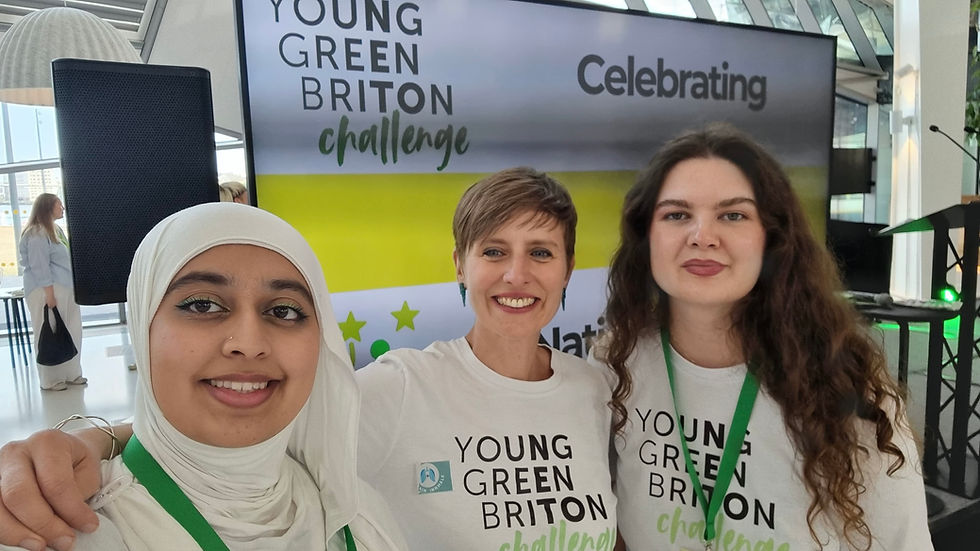what makes the young green briton challenge different?
- Katherine Crisp

- Jul 17, 2023
- 3 min read
As we bring the pilot year of the Young Green Briton challenge to a close I wanted to reflect on some of the things that make it unique, whilst reflecting on some of the challenges and trade offs associated with each area.
A combination of climate education, skills development and empowerment
The materials and programme are structured to raise awareness around a range of different environmental topics, before students split into teams to research, develop and prototype ideas and then present them. Some teams then moved into project implementation developing project management skills, along with a big dollop of resilience and growth mindset.

It’s no surprise that the biggest challenge is finding time within the busy Key Stage 3 curriculum. As we look to the future we will be streamlining and focusing the materials as much as possible. We will reduce paperwork - why have a facilitation guide when it can be embedded into the slides? We will also have different programme offers, enabling Young Green Briton to fit into a half term or termly Geography, Science or DT curriculum whilst also having a ‘super-slim’ version that could be delivered in tutor time or PSHE.
Student-led

Agency and empowerment is at the heart of the Young Green Briton Challenge. Students work in teams, selecting a theme to focus on as a team and then developing ideas. Choice increases motivation, but brings challenges. For example, we can’t plan to match mentors with relevant subject expertise. It’s also hard to guess in advance what the collective impact might be for the projects that students develop. This isn’t an issue for students or schools, but can be an issue when trying to articulate impact to a potential funder.
Going beyond ideas into action
There are tens (if not hundreds) of innovation, STEM and challenge competitions that focus on idea development. These are really important, building design and problem solving skills and enabling really creative thinking and BIG ideas. By going beyond ideas and investing, through seed funding and mentorship, into making ideas happen, the Young Green Briton Challenge supercharges citizenship and skills development. However there is a big difference between the best idea and the most actionable idea. As I shared in my last blog, these two areas are often in tension. Additionally, it’s a big ask for both students and teachers to invest the time in putting an idea into action. We have been impressed by the enthusiasm of students to work on their projects in extra-curricular time, but will be continuing to think about how we can make this as easy as possible through supporting materials and mentorship.
Added value from external mentors
Each seed funded team was paired with an external mentor to support them in implementing their ideas. External mentors provide huge value, bringing different skills, perspectives and networks. Most of these sessions were virtual because of the challenges of matching school and mentor recruitment, which happened in tandem in the pilot year.

The challenge (again!) was time - scheduling regular supervised mentoring sessions with busy mentors in very specific extra-curricular time slots with the usual array of ICT challenges.
Looking to the future we will be targeting recruitment to try and increase the face to face mentoring whilst also engaging mentors earlier in the Young Green Briton journey, recognising the value add for students, teachers and mentors in doing this.
A focus on state schools
According to research by Nesta only 1.5% of the school population have the opportunity to participate in invention and innovation programmes, with disproportionate representation from private schools and in the South-East and London. We are really proud to have worked with 16 diverse schools from across the country in our pilot year. The cluster of schools that very readily signed up to a brand new pilot from the North-West is a proof point for Nesta’s data.
That the overarching challenge is time (aka resources) will come as no surprise to anyone who has worked in a busy state secondary school. In the short term we want to make it as easy as possible for schools and teachers to participate in opportunities such as the Young Green Briton Challenge. But more importantly at Social Innovation for All we believe that future curriculum reform should consider how to embed high quality, cross-curricular project based learning into the curriculum in every school. These types of opportunities shouldn’t rely on teachers having to go the extra mile.





Comments